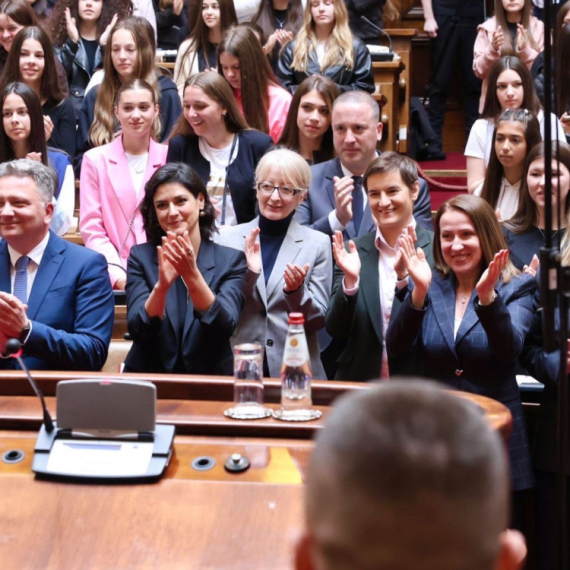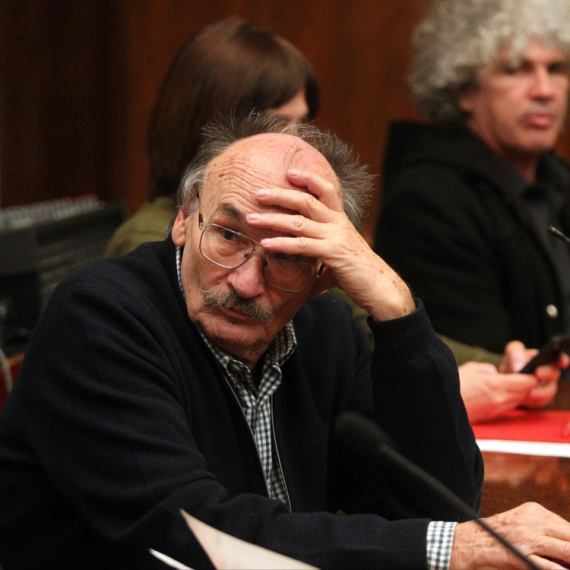RIK upholds U.S., UK monitoring ban
RIK last night upheld its decision to deny permission to U.S. and UK observers to monitor Sunday’s elections.
Friday, 18.01.2008.
09:09

RIK last night upheld its decision to deny permission to U.S. and UK observers to monitor Sunday’s elections. The move came in spite of the Supreme Court’s ruling that the Republic Electoral Commission (RIK) was not authorized to decide on this alone, but should uphold the government’s view that the observers should be granted permission. RIK upholds U.S., UK monitoring ban Following a two and a half hour debate, 14 RIK members from the ranks of the Serb Radical Party (SRS), the Democratic Party of Serbia (DSS), the Socialist Party of Serbia (SPS) and the Reformist Party voted in favor of the motion, and ten, from the Democratic Party (DS), G17 Plus and the Liberal Democratic Party (LDP) against. In its second vote on the motion, RIK rejected the objection of Milos Adamovic of Zemun who proposed an overrule of the Commission decision of January 10, with all the requests to be approved. The observers’ requests appeared on the session’s agenda after the Supreme Court sustained Adamovic’s objection and overruled RIK’s original decision to reject his objection of January 11 over procedural irregularities. The objection was submitted because on January 10 RIK chose not issue the U.S. and British embassies authorization to monitor the elections. The Supreme Court’s ruling, which stated that the court’s interpretation was binding, stipulated that RIK was not authorized to freely decide on observer requests, but to issue monitoring permits on the basis of the government’s opinion. However, on January 16, a majority of RIK members decided not to discuss the Supreme Court’s ruling. According to an Instruction on Conducting Elections, it is stipulated that “having obtained the opinion of the competent state body, RIK issues authorization to foreign observers, on the basis of which they can follow the work of the body for conducting elections.” The competent body in this case is the government which agreed to allow the two embassies to monitor the elections. However, on January 10, RIK was unable to obtain majority approval for this. “RIK has adopted a proposal to allow observers from the Inter-Parliamentary Assembly of the Commonwealth of Independent States and the OSCE permission to monitor the elections, but did not receive a majority to approve the observers from the U.S. and the UK,” read a RIK statement. In the case of these two observers, there was a complete absence of correct logic or legal arguments in taking the decision that should not have been taken, Beta was told by RIK. Having received RIK approval, 23 OSCE observers and three from the Commonwealth of Independent States will be allowed to follow the elections, while a decision on a Slovak application is still pending. The Commission also agreed to grant permission to observers from the Russian Duma to monitor the vote, provided the government gives the green light. 3,087 CeSID observers will also monitor proceedings.
RIK upholds U.S., UK monitoring ban
Following a two and a half hour debate, 14 RIK members from the ranks of the Serb Radical Party (SRS), the Democratic Party of Serbia (DSS), the Socialist Party of Serbia (SPS) and the Reformist Party voted in favor of the motion, and ten, from the Democratic Party (DS), G17 Plus and the Liberal Democratic Party (LDP) against.In its second vote on the motion, RIK rejected the objection of Miloš Adamović of Zemun who proposed an overrule of the Commission decision of January 10, with all the requests to be approved.
The observers’ requests appeared on the session’s agenda after the Supreme Court sustained Adamović’s objection and overruled RIK’s original decision to reject his objection of January 11 over procedural irregularities.
The objection was submitted because on January 10 RIK chose not issue the U.S. and British embassies authorization to monitor the elections.
The Supreme Court’s ruling, which stated that the court’s interpretation was binding, stipulated that RIK was not authorized to freely decide on observer requests, but to issue monitoring permits on the basis of the government’s opinion.
However, on January 16, a majority of RIK members decided not to discuss the Supreme Court’s ruling.
According to an Instruction on Conducting Elections, it is stipulated that “having obtained the opinion of the competent state body, RIK issues authorization to foreign observers, on the basis of which they can follow the work of the body for conducting elections.”
The competent body in this case is the government which agreed to allow the two embassies to monitor the elections. However, on January 10, RIK was unable to obtain majority approval for this.
“RIK has adopted a proposal to allow observers from the Inter-Parliamentary Assembly of the Commonwealth of Independent States and the OSCE permission to monitor the elections, but did not receive a majority to approve the observers from the U.S. and the UK,” read a RIK statement.
In the case of these two observers, there was a complete absence of correct logic or legal arguments in taking the decision that should not have been taken, Beta was told by RIK.
Having received RIK approval, 23 OSCE observers and three from the Commonwealth of Independent States will be allowed to follow the elections, while a decision on a Slovak application is still pending. The Commission also agreed to grant permission to observers from the Russian Duma to monitor the vote, provided the government gives the green light.
3,087 CeSID observers will also monitor proceedings.


























































Komentari 11
Pogledaj komentare